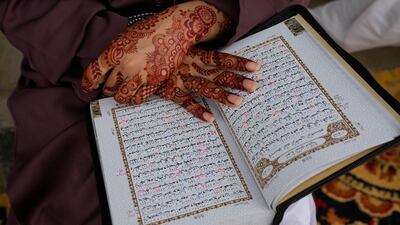The United Nations Human Rights Council on Wednesday approved a contentious motion on religious hatred after the burning of a Quran in Sweden.
The resolution was opposed by the United States and the European Union, who say it conflicts with their views on human rights and freedom of expression.
Twenty-eight countries voted in favour, 12 voted against and seven countries abstained.
In late June, an Iraqi activist outside a mosque in Sweden tore up pages of the Quran and set them alight after police in Stockholm granted a permit for the stunt.
UN human rights chief Volker Turk hosted a debate on Tuesday on the episode in Sweden and in others in other European countries to highlight the line between freedom of expression and respect for religious belief.
Speaking to the Human Rights Council, he called for respect of “all others”, including migrants and those who wear headscarves.
He said recent Quran burnings appeared to be manufactured shows of intolerance to "drive wedges" between people.
During the debate, some western countries condemned intolerance but affirmed the right to freedom of expression. Some predominantly Muslim countries want governments to do more to ban expressions of religious intolerance that could lead to violence.
“We’d like to stress that freedom of expression is an ethical value that should spread to peaceful coexistence rather than causing a clash of civilisations,” said Prince Faisal bin Farhan, Saudi Arabia's Foreign Minister.
“We should spread values of tolerance."
Mr Turk said: “[The Quran burnings] appear to have been manufactured to express contempt and inflame anger, to drive wedges between people and to provoke transforming differences of perspective into hatred and perhaps violence.”
He said people must show respect to “all others” and insisted that “advocacy of hatred that constitutes incitement to violence, discrimination and hostility should be prohibited in every state”.
Mr Turk said hate speech of all kinds was on the rise, even when it is not always deemed to incite violence.
"Dehumanising women and denying their equality with men; verbally abusing Muslim women and girls who wear a headscarf; sneering at people with disabilities; making false claims that migrants or people of specific ethnicities are more likely to engage in crime, all such hate speech is similar in that it stems from the baseline notion that some people are less deserving of respect as human beings,” he said.
Pakistan and Palestine led the push for a council resolution that, among other things, called on countries to take steps to “prevent and prosecute acts and advocacy of religious hatred that constitute incitement to discrimination, hostility or violence”.
The US said it would not support the resolution over concerns that it could trample on a fundamental right to freedom of expression.
“We know from experience that attempting to ban such expression actually usually amplifies it further by bringing even more attention to it and often serves as a catalyst for further hatred," said Rashad Hussain, the US ambassador-at-large for international religious freedom, expressing US opposition to so-called blasphemy laws.
“Such laws also fail to address the underlying causes of bigotry,” he said, calling instead for efforts to "reinvigorate education and interfaith intercultural dialogue to confront hate speech”.
The%20Mother%20
%3Cp%3E%3Cstrong%3EDirector%3A%3C%2Fstrong%3E%20Niki%20Caro%26nbsp%3B%3C%2Fp%3E%0A%3Cp%3E%3Cstrong%3EStars%3A%3C%2Fstrong%3E%20Jennifer%20Lopez%2C%20Joseph%20Fiennes%2C%20Gael%20Garcia%20Bernal%2C%20Omari%20Hardwick%20and%20Lucy%20Paez%3C%2Fp%3E%0A%3Cp%3E%3Cstrong%3ERating%3A%3C%2Fstrong%3E%203%2F5%3C%2Fp%3E%0A
Blackpink World Tour [Born Pink] In Cinemas
Starring: Rose, Jisoo, Jennie, Lisa
Directors: Min Geun, Oh Yoon-Dong
Rating: 3/5
Ipaf in numbers
Established: 2008
Prize money: $50,000 (Dh183,650) for winners and $10,000 for those on the shortlist.
Winning novels: 13
Shortlisted novels: 66
Longlisted novels: 111
Total number of novels submitted: 1,780
Novels translated internationally: 66
Who was Alfred Nobel?
The Nobel Prize was created by wealthy Swedish chemist and entrepreneur Alfred Nobel.
- In his will he dictated that the bulk of his estate should be used to fund "prizes to those who, during the preceding year, have conferred the greatest benefit to humankind".
- Nobel is best known as the inventor of dynamite, but also wrote poetry and drama and could speak Russian, French, English and German by the age of 17. The five original prize categories reflect the interests closest to his heart.
- Nobel died in 1896 but it took until 1901, following a legal battle over his will, before the first prizes were awarded.
COMPANY%20PROFILE
%3Cp%3ECompany%20name%3A%20CarbonSifr%3Cbr%3EStarted%3A%202022%3Cbr%3EBased%3A%20Dubai%3Cbr%3EFounders%3A%20Onur%20Elgun%2C%20Mustafa%20Bosca%20and%20Muhammed%20Yildirim%3Cbr%3ESector%3A%20Climate%20tech%3Cbr%3EInvestment%20stage%3A%20%241%20million%20raised%20in%20seed%20funding%3Cbr%3E%3C%2Fp%3E%0A
The specs
Engine: 6.2-litre V8
Power: 502hp at 7,600rpm
Torque: 637Nm at 5,150rpm
Transmission: 8-speed dual-clutch auto
Price: from Dh317,671
On sale: now
Key facilities
- Olympic-size swimming pool with a split bulkhead for multi-use configurations, including water polo and 50m/25m training lanes
- Premier League-standard football pitch
- 400m Olympic running track
- NBA-spec basketball court with auditorium
- 600-seat auditorium
- Spaces for historical and cultural exploration
- An elevated football field that doubles as a helipad
- Specialist robotics and science laboratories
- AR and VR-enabled learning centres
- Disruption Lab and Research Centre for developing entrepreneurial skills
Naga
%3Cp%3E%3Cstrong%3EDirector%3A%C2%A0%3C%2Fstrong%3EMeshal%20Al%20Jaser%3C%2Fp%3E%0A%3Cp%3E%3Cstrong%3EStarring%3A%C2%A0%3C%2Fstrong%3EAdwa%20Bader%2C%20Yazeed%20Almajyul%2C%20Khalid%20Bin%20Shaddad%3C%2Fp%3E%0A%3Cp%3E%3Cstrong%3ERating%3A%20%3C%2Fstrong%3E4%2F5%3C%2Fp%3E%0A
The Specs
Price, base Dh379,000
Engine 2.9-litre, twin-turbo V6
Gearbox eight-speed automatic
Power 503bhp
Torque 443Nm
On sale now
Company%20profile
%3Cp%3E%3Cstrong%3ECompany%20name%3A%3C%2Fstrong%3E%20Letswork%3Cbr%3E%3Cstrong%3EStarted%3A%3C%2Fstrong%3E%202018%3Cbr%3E%3Cstrong%3EBased%3A%3C%2Fstrong%3E%20Dubai%3Cbr%3E%3Cstrong%3EFounders%3A%20%3C%2Fstrong%3EOmar%20Almheiri%2C%20Hamza%20Khan%3Cbr%3E%3Cstrong%3ESector%3A%3C%2Fstrong%3E%20co-working%20spaces%3Cbr%3E%3Cstrong%3EInvestment%20stage%3A%3C%2Fstrong%3E%20%242.1%20million%20in%20a%20seed%20round%20with%20investors%20including%20500%20Global%2C%20The%20Space%2C%20DTEC%20Ventures%20and%20other%20angel%20investors%3Cbr%3E%3Cstrong%3ENumber%20of%20employees%3A%3C%2Fstrong%3E%20about%2020%3C%2Fp%3E%0A
COMPANY%20PROFILE
%3Cp%3E%3Cstrong%3ECompany%20name%3A%3C%2Fstrong%3E%20Dresos%3C%2Fp%3E%0A%3Cp%3E%3Cstrong%3EStarted%3A%3C%2Fstrong%3E%20September%202020%3C%2Fp%3E%0A%3Cp%3E%3Cstrong%3EFounders%3A%3C%2Fstrong%3E%20Vladimir%20Radojevic%20and%20Aleksandar%20Jankovic%3C%2Fp%3E%0A%3Cp%3E%3Cstrong%3EBased%3A%3C%2Fstrong%3E%20Dubai%2C%20UAE%3C%2Fp%3E%0A%3Cp%3E%3Cstrong%3EIndustry%3A%3C%2Fstrong%3E%20Fashion%3C%2Fp%3E%0A%3Cp%3E%3Cstrong%3EFunding%3A%3C%2Fstrong%3E%20%24285%2C000%3B%20%24500%2C000%20currently%20being%20raised%3C%2Fp%3E%0A%3Cp%3E%3Cstrong%3EInvestors%3A%3C%2Fstrong%3E%20Crowdfunding%2C%20family%2C%20friends%20and%20self-funding%3C%2Fp%3E%0A


